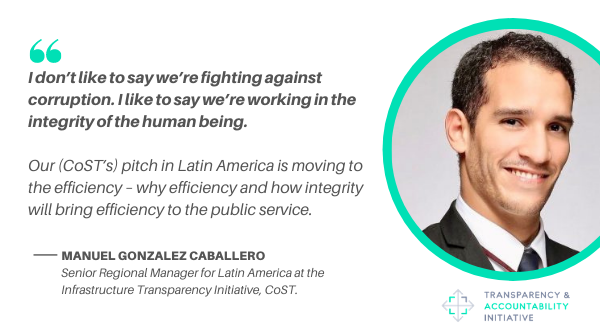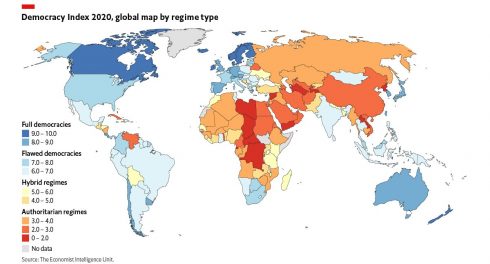Don’t sleep on it! Last chance to tell us how you feel about the TAI Weekly Newsletter and how we can serve you better in our ongoing survey
Highlights
- Gov gaps
- News worthies
- Data front lines
- Growing pie (unequal slices)
- $ worries, participation does matter, climate tracking
- Changing of the guard
- TAI Spotlight: The future of the Open Society Foundations
Gov gaps
We start with the big picture this week. No doubt that a pandemic and economic crisis have revealed weaknesses in multilateral responses. Debapriya Bhattacharya and Sarah Sabin Khan offer a call for more inclusive and networked global governance, hoping to bridge a growing gap between those shaping global/regional responses and those with vital local knowledge that should inform policy design.
Sticking with big ideas, Elaine Dezenski makes a case for the creation of an International Anti-Corruption Court (IACC) to prosecute corrupt officials when their governments are unable or unwilling to do so. This follows a similar demand from more than one hundred world leaders from over forty countries.
Such a proposal is the type of thing that becomes an “announceable” for global summits. With plans gearing up for Biden’s proposed Summit for Democracy, Joe Powell and Kate Meads reflect on lessons learned from the UK anti-corruption summit five years ago. How to ensure that such high-level international events have a lasting impact? Engineer greater accountability for implementing commitments above all.
Meanwhile, a new open-access book from the Basel Institute on Governance explores the rapid growth of illicit enrichment legislation around the world and its use to target corruption and recover stolen assets.
Turning to the regional level, Andreas Feldmann, Federico Merke, and Oliver Stuenkel examine the state of Latin American governance and propose ten ideas that may help strengthen a constructive dialogue in the region in this troubled time.
News worthies

Image Source: Joanne McCall
Building on last week’s coverage, sad to see the Hong Kong independent newspaper close its doors and publish its last edition this past week.
More cheering, great to see Zorayda Gellegos Valle win the 2021 TRACE Prize for Investigative Reporting for her investigation that uncovered the Mexican Army’s scheme to divert public resources through shell companies. Good, too, to see Matthew Caruana Galizia continue his mother’s investigative work with the ‘Passport Papers’ in Malta.
Staying in Malta, Prime Minister Robert Abela swore to push ahead with planned reforms aimed at tackling financial wrongdoing after news of Malta’s greylisting by the Financial Action Task Force. Hopefully those extend to addressing beneficial ownership shortcomings. Maltese officials might want to read Chinwe Ekene Ezeigbo’s lessons from implementing beneficial ownership disclosure regimes in Armenia, Kenya, Nigeria, Ukraine, and the UK. Seems political will is not enough, the requirements for beneficial ownership transparency regimes are ambitious, especially for developing countries, and the devil is in the details.
Great to see seven projects from France, India, Mexico, Nigeria, Paraguay, and the United States selected for support to advance procurement reforms and delivery as part of the Open Contracting Partnership’s impact accelerator program, Lift. For more such news, checkout Datasketch’s new open government newsletter and the World Bank’s govtech newsletter (just in case you don’t have enough info sources!)
Data front lines
Claudia Wells at Development Initiatives writes of their Data Values Project seeking to leverage data and technology to address inequality and promote inclusion. They want to hear from you on what genuine inclusion looks like across the data value chain and how we can make this standard practice.
Barbara Paes highlights the barriers to collaboration between social justice organizations and data and digital rights groups, while Frederick Mostert and Alex Urbelis argue for more transparency and accountability over social media platform algorithms. In light of the EU’s proposed Digital Services Act, Rosie Sharpe responds that big tech auditors need access to the algorithms used, the data they’ve been trained on, and what they’re designed to optimize in order to audit effectively.
How do civil society organizations handle data? How do they keep it safe? And how did the COVID-19 pandemic impact data practices in the sector? Read what responses from 11,758 civil society organization technology decision makers in 135 countries tell us.
Growing pie (unequal slices)
Credit Suisse has released its 2021 Wealth Report, and rather counter-intuitively, it notes that wealth continued to grow this past year despite the pandemic. Total global wealth grew by 7.4% in 2020, and there are now over 56m millionaires. Of course, what the report doesn’t attempt to show is the distribution of that wealth – no prizes for guessing that it is the rich who really got richer.
Could one response be to create people’s capital funds? An interesting proposition out of California to use “pre-distribution” to harness capital to fund public goods. Worth philanthropic support?
Merryn Somerset Webb suggests that concerns about private equity stewardship of companies really come down to issues around transparency and participation. For a far more wide-ranging critique of private capital – see our Long Read below.

Long read: Runaway train: The perilous and pernicious path of private capital worldwide
You may want to check out this book from Empower team centered on where private capital comes from, its trends, and dangerous features. The book also comes with recommendations for funders, including a call to expand corporate accountability philanthropy and target private capital, which the authors argue increasingly harms people and the planet.
$ worries, participation does matter, climate tracking
If governments do agree to a global minimum tax, what will that mean for the maze of existing tax incentives at country level, not least in the extractives sector? Alex Readhead, Thomas Lassourd, and Howard Mann offer their take, while a Publish What You Pay report explores the fiscal regimes governing the extractive sectors in Tanzania, Mozambique, and Uganda and provides recommendations to improve tax revenues. Meanwhile, the Nigeria government, worried for its future revenues, has the environment minister argue that defunding oil and gas initiatives hurt low-income countries that rely on extractive industries for development.
How does this all play out for citizens? Last week, Suneeta Kaimal talked how transparency, participation, and accountability can bring about positive change in the natural resource sector. Now, a research collaboration between the University of Oslo and former and current EITI International Secretariat staff examines how civil society participation influences multi-stakeholder initiatives and whether the findings change when civic space is restricted.
Sadly for communities in the Sahel, the rise of jihadism is tied to expansion of illegal gold mining and they are too often the losers as Neil Munshi’s long read reveals.
This write up on philanthropy and climate change offers a great state of play and flags some of the thorny issues, such as how to boost accountability of climate funding commitments. Perhaps you can have more hope of tracking international finance institution contributions as the World Bank agrees to release annual progress reports on its climate programming as well as boost its climate investment. Vitor Gaspar and Ian Parry at the IMF call for an international carbon pricing arrangement as the Fund moves to include climate change in its standard country economic surveillance and financial stability assessment programs.
Changing of the guard?
Warren Buffet resigns trustee role at Bill and Melinda Gates Foundation which is in midst of rethinking the foundation’s governance for the future. Fascinating to read his personal statement noting the change and his reflections on philanthropy.
Inequality abounds in philanthropy, and Vu Le argues that new legislation to curb the most unfair practices deserves support. Lisa Pilar Cowan urges foundation presidents to act like community leaders, not gatekeepers and the Communications Network encourages philanthropic organizations to continue incorporating DEI practice into their mission and culture.
As part of a series of first-person reflections of McKnight Foundation’s staff in light of George Floyd and the racial justice movement, Funlola Otukoya reflects on the concept of power under three lenses: Who has power? Who has the power to wield it? How do we give power away? Food for thought for an upcoming TAI funder call on participation in funder strategy setting.
Finally, TAI attended Grantmakers for Effective Organizations’ 2021 Learning Conference — here are some reflections from the organizers about asking the right questions, centering BIPOC voices, and fostering learning.
TPA Full Disclosure: Manuel Gonzalez Caballero on working to strengthen integrity in construction

What is it like fighting for transparency in the construction sector in Latin America? We spoke with Manuel Gonzalez Caballero, the Senior Regional Manager for CoST’s program in Latin America and one of the first Panamanians to work and develop construction transparency programming in the region.
Before joining CoST, Manuel helped develop the first Anti-Corruption Risk Map with the United Nations Office for Drugs and Crime. He also worked for the Panama National Procurement Office, leading the implementation of transparency and open government reforms.
TAI Spotlight: The future of the Open Society Foundations
The future of the Open Society Foundations | Open Society Foundations
President of the Open Society Foundations, Mark Malloch‐Brown, writes about the ongoing fundamental changes at the Foundation. Specifically, the Foundation is shifting to a more integrated approach, envisioning six regional strategies and a single global strategy under three enduring commitments — Justice, Equity, and Expression. New changes manifest as the Foundation welcomes Salil Shetty named Vice President of global programs and Mary Fitzgerald as the Director of Information Democracy in a newly created role to fulfill the foundation’s mission worldwide
New transportation strategy addresses climate change, health and the economy | Hewlett Foundation
The foundation recently launched a $100 million, five-year strategy for its transportation grantmaking—focused on electrifying all road transportation in the next two decades while empowering the voices of diverse communities. Learn more from their Environment Program Officer, Anand Gopal.
Data and digital rights in Nigeria | Luminate
This commissioned report from Nigeria’s data advisory and analytics firm Stears Data provides insight into key issues in data and digital rights; effective approaches to addressing those issues; and opportunities for impact, with input from representatives in the public and private sectors, civil society, and media.
Job Listings
- Researcher at ICTD – June 30, 2021
- Communications Consultant, ICTD DIGITAX Programme – July 5, 2021
- Board of Directors at Global Integrity – July 16, 2021
- Job postings at Hewlett Foundation – Ongoing
- Job postings at MacArthur Foundation – Ongoing
- Job postings at Open Society Foundations – Ongoing
- Job postings at Luminate – Ongoing
- Job postings at Ford Foundation– Ongoing
- Job postings at FCDO – Ongoing
Calls/Opportunities
- West Africa Civil Society Institute (WACSI) call for papers and articles – Open year-round
- USAID’s Development Innovation Ventures (DIV) grant funding– Ongoing
- Call for research proposals Tax and civil society – No Deadline
- Free Digital Security Training– Ongoing
- Call for proposals: Informality, tax, and the state– Proposals accepted on a rolling basis
Calendar
- Tax Justice Network 2021 Conference – July 6-9, 2021
- Global Investigative Journalism conference – November 3-5, 2021
- National Tax Association conference – November 18-20, 2021
Want to stay updated on happenings around the TPA sector, sign up for our newsletter here



